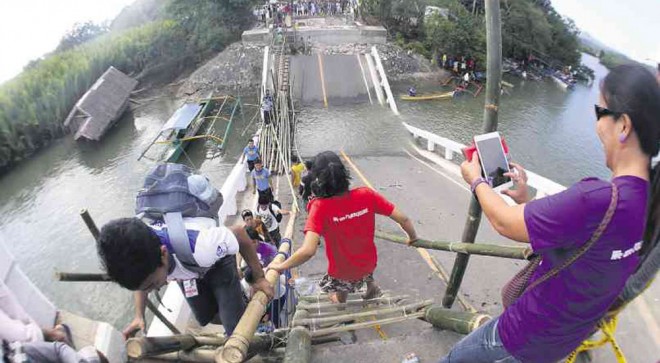Bohol plans for disaster-resilient houses

A FOOTBRIDGE makes it possible for people to cross Abatan Bridge in Maribojoc town, Bohol province, after a 7.2-magnitude earthquake hit the province. LITO TECSON/CEBU DAILY NEWS
TAGBILARAN CITY—Two nongovernment organizations (NGOs)—Habitat for Humanity and Gawad Kalinga—have submitted their proposed designs for the residents rendered homeless by the 7.2-magnitude earthquake on Oct. 15 that damaged or destroyed Bohol province’s roads, bridges, schools and churches.
Nemia Antipala, assistant Central Visayas director of the Department of Social Welfare and Development, said they had met with Gov. Edgar Chatto and that proposals for disaster-resilient houses were being studied.
“Their design would be best suited for that eventuality. It has been predicted that every year, there will be stronger and stronger typhoons. So that is something we have to plan for,” she told the Inquirer on Thursday.
She said the houses must endure winds with a strength of 220 kilometers per hour.
Provincial officials are looking forward to the rehabilitation phase more than 50 days after the disaster struck Central Visayas.
Total damage in Bohol was estimated to have reached P7.862 billion, Chatto said during his presentation of the four-year rehabilitation and recovery plan for Bohol when President Aquino visited the island-province on Nov. 28.
The President has promised a P5-billion allocation to help in the rehabilitation. The reconstruction and rehabilitation of roads and bridges in the province will need around P138 million.
Two bridges, Tultogan Bridge in Calape town and Disamparados Bridge along the Tagbilaran north road, are also scheduled for completion.
During his visit, President Aquino inaugurated the temporary steel bridge in Abatan connecting the towns of Cortes and Maribojoc.
All roads damaged by the earthquake are now passable, although the rehabilitation is ongoing.
The earthquake also damaged or destroyed 169 health facilities at an estimated cost of P164 million, Health Secretary Enrique Ona also reported.
The repair of damaged health facilities and the construction of new ones would require P289 million, Ona said.
Temporary shelters
Right after the earthquake that destroyed 8,083 houses and damaged 34,527 others, 64 evacuation centers were put in place, where tents distributed by different agencies and NGOs served as temporary shelters for more than 40,000 displaced families.
At present, only one community evacuation site, located in Tubigon town, for 103 families remains. “All remaining evacuees are now home-based, staying just outside their homes,” Chatto said.
They also provided cash assistance for those with partially damaged houses but the residents would have to do the repair work, Antipala added.
The assistance will be channeled through the local government unit (LGU) and the LGU will give the cash assistance to the affected family.
Antipala explained that the assistance would be made available to those who belonged under the poverty threshold, with an income of P12,000 and below.
Classes
Classes that have been disrupted for two weeks following the earthquake have resumed.
The Department of Education (DepEd) reported that 672 of the 1,091 public school buildings in the province sustained damages and had to be repaired or rebuilt.
On Nov. 1, temporary learning spaces in the towns of Loon, Maribojoc and Antequera were set up. These were being used as temporary classrooms since classes resumed on Nov. 5.
Dr. Wilfreda Bongalos, DepEd Bohol provincial superintendent, told the Inquirer that they noted a 100-percent attendance of students in the first Monday of December.
Bongalos said they had started to hold Saturday classes to make up for the required number of school days. With this scheme, they are set to finish classes on April 9 and will hold graduations by April 10.
Some schools were still on shifting mode because these lacked makeshift tents, she added.
Bongalos, however, said organizations, such as the United Nations Children’s Foundation and Save the Children, would bring in more tents.
Starting the second week of December, she said no schools would hold classes in shifts.
Bongalos said they had identified six schools in Calape, Loon and Antequera that have to be relocated to a safer place.
The DepEd is coordinating with the Mines and Geosciences Bureau in Central Visayas to identify safe locations for these schools.














